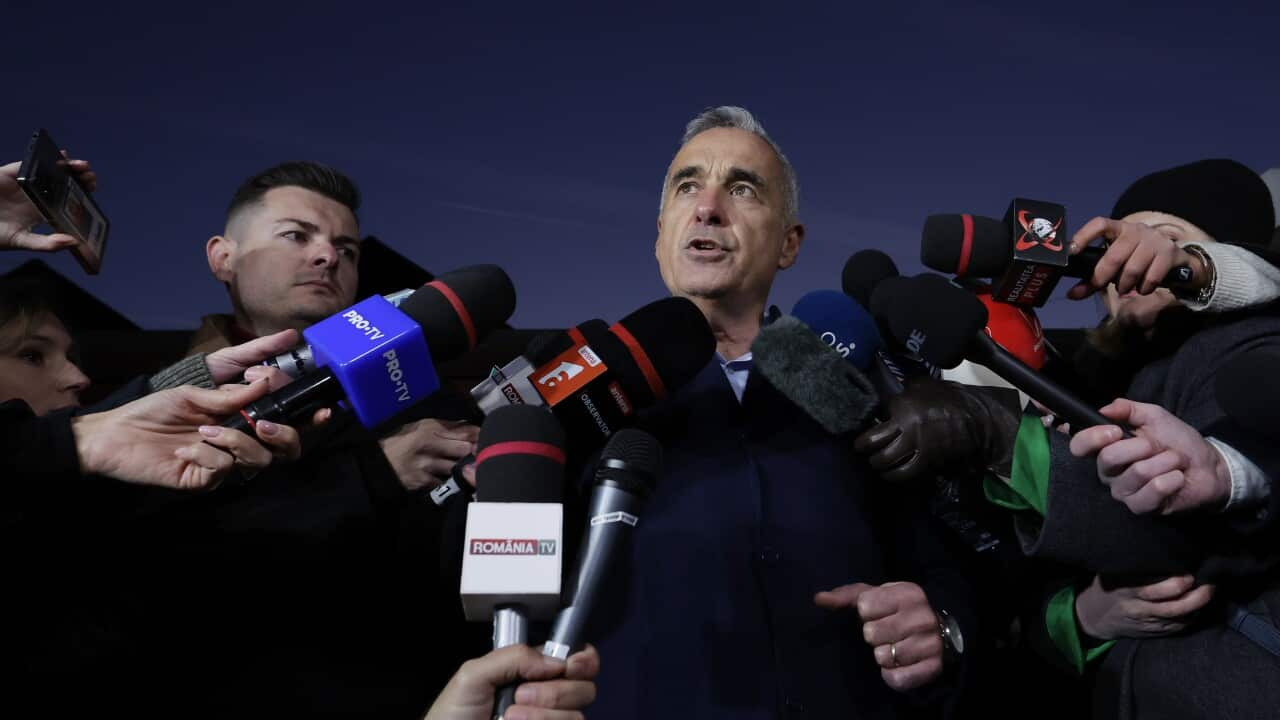Key Points
- Romania's top court has ordered a recount of votes in the first round of the presidential election.
- Far-right politician Calin Georgescu surged to a victory that raised questions.
- The decision adds to the turmoil surrounding the electoral process in Romania.
Romania's top court has ordered a recount of votes in the first round of the presidential election and the country's top security body warned Romania was a key target for hostile actions from Russia after a shock result in the ballot.
Having polled in single digits before Sunday's vote, independent far-right politician Calin Georgescu surged to a victory that raised questions over how such a surprise had been possible in the European Union and NATO member state.
The Constitutional Court "unanimously ordered the re-verification and recounting of the voting ballots for the November 24 presidential election," it said in a statement on Thursday.
LISTEN TO

Far-right populist leads Romania's presidential poll
SBS News
26/11/202401:16
The decision adds to the turmoil surrounding the electoral process in Romania, which is scheduled to hold three ballots in as many weeks, votes that are crucial to the direction of a country that has been pro-Western and a staunch ally of Ukraine.
Georgescu has previously praised 1930s Romanian fascist politicians as national heroes and martyrs, has been critical of NATO and Romania's stance on Ukraine, and has said the country should engage, not challenge Russia.
He is due to face centrist contender Elena Lasconi in a run-off on 8 December. Meanwhile, a parliamentary election is scheduled for Sunday.
Romania's Supreme Council of National Defence, the country's top security body which includes the president and prime minister alongside relevant defence institutions, said on Thursday it had evidence of cyber attacks meant to influence the electoral process.
"A presidential candidate benefited from massive exposure through preferential treatment given to him by the TikTok platform by not labelling him as a political candidate and not asking him to label electoral content," the council said in a statement.
It said that Romania was a key target for "hostile actions by state and non-state actors, especially the Russian Federation".
There was no immediate comment from Russian authorities, but it has previously denied interfering in foreign elections.
A TikTok spokesperson said, "It is categorically false to claim his [Georgescu's] account was treated differently to any other candidate", adding it had removed videos at the request of Romanian authorities within 24 hours.
Georgescu gained many votes from young voters and Romanians living abroad, and his campaign relied heavily on TikTok.
On Wednesday, a senior official at Romania's telecoms regulator called for TikTok to be suspended pending an investigation into the platform's role in the election.
Lasconi condemned the Constitutional Court's decision in a post on her social media accounts.
"The Constitutional Court is interfering in the democratic process for the second time," she wrote, referring to a previous court decision to ban a far-right politician from running in the presidential election.
"One combats extremism through votes, not backstage games."
Georgescu said in a statement that state institutions were trying to deny people's vote in Sunday's election.
The decision to call for a recount was made after conservative presidential candidate Cristian Terhes, who got 1 per cent of the votes on Sunday, challenged the ballot's result.
Terhes has asked that the court annul the election outcome, alleging that Lasconi got votes transferred to her from another candidate who had withdrawn from the race but still appeared on the ballots.
The court postponed a ruling for 29 November and asked for a recount. The court will only provide the reasoning for its decision in a statement at a later date.
By law, the top court needs to validate the first round result by 29 November for the run-off vote to happen on 8 December as scheduled. But the head of the country's election authority said recounting 9.46 million votes currently in archives at courthouses across Romania would take days.












